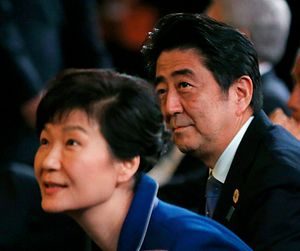This year marks the 50th anniversary of the restoration of diplomatic relations between Japan and Korea with the signing of the Treaty on Basic Relations signed in 1965. The occasion should provide impetus for Tokyo and Seoul to improve their strained relationship. But instead of being a year to celebrate a host of joint accomplishments of the past five decades, the opportunity may be squandered as the two sides remain at loggerheads over a host of historical and territorial issues emanating from Japan’s colonial occupation of the Korean peninsula before and during World War II.
Japan’s Prime Minister Shinzo Abe has thus far failed to gain any traction with Korean President Park Geun-hye and the two leaders have not had a bilateral meeting of length or significance since Park took office in early 2013. Yet despite this lack of high-level engagement, there remains a sustained push at the bureaucratic level to improve cooperation and drive the relationship until the political stalemate abates.
One key less-discussed area of cooperation is international development. Last month, Tokyo hosted a Japan-Korea High Level Policy Dialogue for Development. The session followed up on the last dialogue that was held in Seoul in 2012, before Abe was elected. The resumption of high-level talks on development mirrors recent senior-level cooperation between Japan and Korea in other areas such as energy and the environment. During the Dialogue, the two sides exchanged views on their respective development policies and also looked at areas for cooperation in shaping the post-2015 Development Agenda related to the UN Millennium Development Goals. Regionally, Japan and Korea also pledged to enhance cooperation in key areas such as disaster relief, infrastructure development, and global health issues.
After the three year gap between meetings, momentum on bilateral development cooperation has now resumed with a pledge to hold the next dialogue in 2016. But the dialogue was also significant because it provided an opportunity for Japan to explain the recent reforms to Tokyo’s development policies. Falling in line with Japan’s new National Security Strategy released in late 2013, the Abe government has altered its development policies so that they are aligned more closely with Japan’s security and foreign policy – specifically Tokyo’s desire to be a “proactive contributor to peace” in the region. While the change had been planned for years, the official decision came last month with a Cabinet decision to alter the Development Cooperation Charter. The new interpretation effectively widens the scope of development and purpose of overseas development assistance (ODA) to include areas such as peace building, governance, and humanitarian assistance.
Communication between Seoul and Tokyo on this issue is critical, especially in light of skepticism many in Korea share with regard to Abe’s security reforms and his push for a more proactive Japan in the region. Several Korean officials have bristled, both publically and privately, at Japan’s decision to reinterpret its constitutional right to collective self-defense, a move that – ironically – would enhance joint deterrent efforts against North Korea. Similarly, Seoul remains wary about Abe’s talk of constitutional revision and the reorientation of Japan’s Self Defense Forces to a more “normal” posture. In light of this underlying mistrust, a steady flow of exchanges between senior diplomats on both sides – like the development dialogue – should help put Seoul at ease over Abe’s entire “proactive peace” package.
On the development front, Japan, managed through the Japan International Cooperation Agency (JICA), remains the stalwart in Asia in terms of providing ODA. Tokyo contributed more than $10 billion in ODA last year, a figure surpassed only by the U.S., U.K., and Germany. Despite an incremental decline in ODA funding (which peaked in 1997 at $15 billion per annum) over the past two decades, Japan still provides more assistance than the entire Asia-Pacific region combined. Indeed, aside from Japan and Australia – which contributes about $5 billion annually – there is still very little ODA coming from Asia. The next largest contributor is Korea, which provided just over $2 billion in ODA last year.
Yet, while Korea’s ODA remains modest, the pace of its growth portends well for the region. Seoul has pledged to raise its ODA level to $3 billion annually by the end of this year and elevate its share to 0.25 percent of its Gross National Income (GNI). Comparatively, in GNI terms Japan’s ODA allotment has now fallen below 0.2 percent. Moreover, Korea’s history with regard to development assistance is positive for the region. Seoul itself was a net-recipient of ODA until the late 1990s and received more than $12 billion since the end of World War II – much of that from Japan. This aid helped Korea achieve remarkable growth from an impoverished post-colonial and post-conflict state to its current status as one of Asia’s economic engines. Korea has now transitioned from recipient to a net-donor, driven through its Korea International Cooperation Agency (KOICA).
Strong bilateral cooperation on development is a good step for the broader Japan-Korea relationship. But, more importantly, a shared agenda will also help promote an Asian model for development that can be unique and focus on the challenges faced by the region – especially with regard to disaster relief and humanitarian assistance. In laying the foundations for an Asian development model now, Seoul and Tokyo ensure that their influence and priorities can be sustained in the medium term before future ODA players such as China and India inevitably emerge. And while Japan’s ODA has fallen nearly 50 percent from its peak in 1997, there is an opportunity now to work together with Korea – with its growing ODA share – on shared priorities to mitigate lost influence. Strengthening the High-Level Dialogue and quasi-institutionalizing bilateral cooperation on development would be good first steps that could help align common strategic interests for both countries.

































